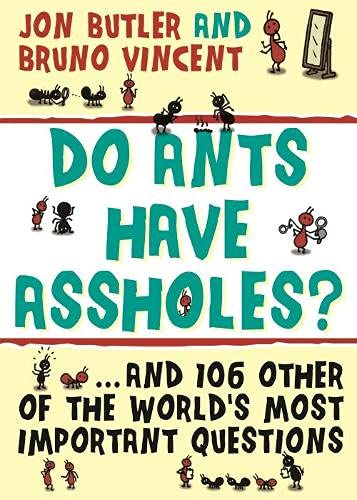Bargain Bin Books
Do Ants Have Assholes?: And 106 of the World's Other Most Important Questions
Couldn't load pickup availability
Author: Butler, Jon
Number Of Pages: 192
Details:
"Every year, one funny book seems to stand out from all the others. This year, it's Do Ants Have [Assholes]? a rip-roaring parody" Spectator "The book being touted as this year's can't-miss, downstairs-loo-fixture of a dead-cert publishing-phenomenon-sensation" Guardian "A very funny spoof of pop-science collections" Daily Telegraph A venerable and historic newspaper, the Old Geezer is read and respected by the world's most conscientious, upright citizens. When these beacons of respectability have serious questions, they turn to the Old Geezer's "Questions and Answers" page. Do Ants Have Assholes? collects the enlightening answers to thought-provoking questions such as: If you see an endangered animal eating an endangered plant, what do you do? How many men would it take to kill an elephant with their bare hands? If one synchronized swimmer drowns, do they all have to drown? Are "crabs" related to crabs? What if there were no hypothetical questions?
About the Author:
Jon Butler has received no prizes for his writing. He does not divide his time between New York and the South of France. Bruno Vincent has never been regarded as an acknowledged expert in any field or set up his own off-beat quarterly publication. Excerpt. © Reprinted by permission. All rights reserved. Are there any undiscovered colors? Sir Michael Cummings, Biggin Hill I have been furiously mixing paints ever since this question appeared in last month's issue and am astonished and proud beyond measure to be able to announce that I have discovered what I believe to be an entirely new color! By mixing blue paint and red paint, I have come up with a wonderfully rich, regal hybrid that is somehow warmer and more mellow than blue, and cooler and more elegant than red. I call it "Simon," because my name is in fact Simon. I am enclosing a swatch of pure Simon for you to reproduce in your magazineperhaps on the cover?!? Simon Sayers, Durham County [Ed note: We're not entirely sure, Simon, but we think you might have made purple. Thanks for trying, though.] Not to be disrespectful, but this could very well serveas a kind of prototypical stupid question, much as Donald Rumsfeld's words about "known knowns" and "unknown unknowns" have become bywords for political bluster and obfuscation. The way the human eye reacts to the light it receives determines the colors we see. A point often made is that we can never be sure that while we agree something is "brown," we are seeing the same color. In theory I might receive a blow to the head and wake up seeing completely different (or "new") colors but never know the difference. Synesthesia is interesting in its implications for thisit results mostly from neurological trauma. In the USSR one Yuri Zherkov survived a plane crash near Katerinapol and afterwards saw colors in musical notes. Taken to the National Soviet Gallery, he was able to play many of the great paintings there in astonishing improvised arrangements on the piano. He had always been tone deaf, however, and his later attempts to paint the great Russian composers' works were met with critical revulsion, official anger, and banishment to a Gulag for anti-Soviet aesthetic tendencies, where he died of potato poisoning. Greg Maresh, Cubbling, Alaska What was the best thing before sliced bread? Simone Taylor, London Wooden legs, stout, second wives, the King James Bible, iron bridges, public executions, hot acorns at the theater, the London Bridge, and Rita Hayworth's tits are among the things that have been historically referred to as "the best thing since." Many other verbatim references are to be found among letter-writers, diarists, and journalists to "the worst thing since": the Black Death, Alaskan whores, that bastard Cromwell, France, the French, French anything, German anything (foreign anything, in fact), the Industrial Revolution, and, in Whitman's famous words, "the law against buggery." Terry Graite, Holyhea
UPC: 760789223983...
EAN: 9781402218187
Release Date: 01-04-2009
Languages: English
Item Condition: New
Binding: Paperback
Share


